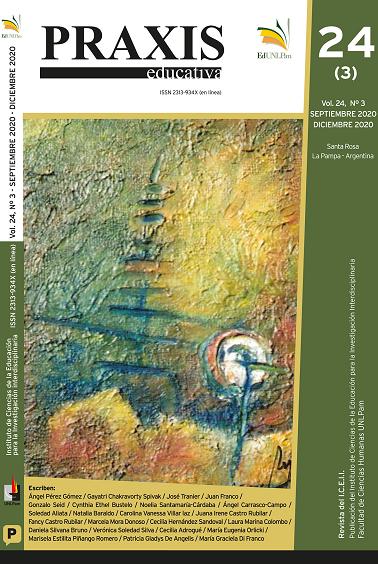Humanities, democracy and the politics of knowledge in higher education
DOI:
https://doi.org/10.19137/praxiseducativa-2020-240313Keywords:
Humanities, democracy, higher education, subalternAbstract
This chapter is divided into three somewhat disjointed parts. I have not tried to create artificial transitions. The first section is an edited transcript of only part of what actually happened at the podium ¿can the subaltern speak?. The second part is something like a prepared paper. The third part is answers to a series of questions generated: how can the humanities produce the intuitions of democracy in the broadest possible race, class- and gender-diversified sector of the population? What is it to teach the humanities? What is the in-built aporia of democracy? How do we confront the inevitable corporatisation of the entire education system? What is the role of the curriculum? What is the relationship between class, race, and liberal education in our countries? What is the relationship between a will to social justice and enforcement? What is it to interpret a history of violence and use it without accusation or excuse within the broadest interpretation of the academy? Why is national liberation not a revolution? How do we combat the anthropocene?
Downloads
References
Apter, E., Lezra, J., & Wood, M. (Eds.). (2014). Dictionary of untranslatables: A philosophical Lexicon. Princeton, NJ: Princeton University Press.
Council on Higher Education. (2014). Quality enhancement project: The process for public higher education institutions. Pretoria, South Africa: Council on Higher Education. Recuperado de http: //www.che.ac.za/sites/default/files/publications/QEP%20Process%20for%20Public% 20HEls%20Feb%2020 14.pdf
Derrida, J. (1967). De la grammatologie. Paris: Minuit.
Fanon, F. (1965). A dying colonialism. New York, NY: Grove Press.
Grayson, D. (2014). The quality enhancement project: A systemic intervention for improving teaching and learning. Recuperado June 6, 2016, from http://www.iced2014.se/proceedingsI1219 _GRAYSON .pdf Hoover, E. (2014, August 3). Going professional: The ins and outs. The New York Times, p. 6.
James, W. (2008). Imagination, not culture: A singular example. Conferencia inédita, Harvard Divinity School, Cambridge, MA.
Mkandawire, T. (2015). Africa: Beyond recovery. Legon-Accra: Sub-Saharan Publishers.
Panda, N. (n.d.). Margins and marginal communities: A practical keynote. In Press. Prusak, L. (Ed.). (1997) Knowledge in organizations. Newton, MA: Butterworth. Spivak, G. (1999). A critique of postcolonial reason: Toward a history of the vanishing present. Cambridge, MA: Harvard University Press.
Spivak, G. (2014). Resisting trivialization. Profession, In Press.
Downloads
Published
Issue
Section
License
Copyright Notice
Editorial Committee Educational Praxis Magazine:
I hereby declare that I am the author of the article titled (article name), that it is original and my own and that it was not previously published in any other format or medium. I declare to know that the magazine will not charge me any type of fee under any circumstances, nor will I receive any type of monetary compensation If it were accepted for publication in Educational Praxis, I authorize the aforementioned magazine to publish it digitally and to advertise it on its social networks.
If the work is published, I adhere to the Creative Commons license called "Attribution - Non-Commercial Share Alike CC BY-NC-SA", through which it is allowed to copy, reproduce, distribute, publicly communicate the work and generate derivative works, as long as when the original author is cited and acknowledged. This license has been used since September 2018. In 2016 CC BY NC ND 4.0 was adhered to; and in the years 2017 and 2018 (January-August) CC BY NC 4.0.
This CC BY-NC-SA Share Alike license does not, however, permit commercial use of the work. As an author, the journal may establish additional agreements for the non-exclusive distribution of the version of the work published in the journal, it allows me to self-archive the published articles, in their post-print version, in institutional, thematic repositories, personal web pages or any other relevant use. with the recognition of having been first published in this journal.
Educational Praxis adheres to DORA (Declaration on Research Assessment) signed in San Francisco, California, on December 16, 2012, and to the Declaration of Mexico (Joint Declaration LATINDEX - REDALYC - CLACSO - IBICT).















_(1)2.png)


3.png)











_(2).png)






2.jpg)









